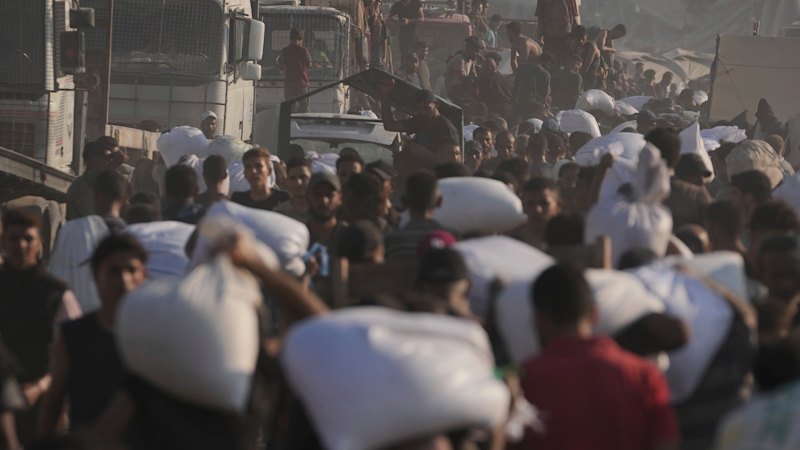
UPDATE: Israel’s military has just announced a major initiative to airdrop aid into Gaza, responding to mounting international outcry over starvation-related deaths. This urgent development follows a sharp increase in casualties as hundreds of Palestinians have been killed while attempting to access food distribution sites.
The announcement, made late on October 14, 2023, outlines plans for humanitarian corridors to be established for United Nations convoys, alongside the airdrops. Despite these efforts, the military emphasized that combat operations against Hamas would continue. The location for these airdrops has not been disclosed.
The humanitarian situation in Gaza has reached a critical point, with reports indicating that at least 53 people were killed overnight, primarily while seeking aid. Local health officials reported that most casualties stemmed from Israeli airstrikes and gunfire, particularly near the Zikim crossing. Witnesses described a chaotic scene where families rushed towards what they thought were aid trucks, only to face lethal fire from Israeli tanks.
“You die to fetch some food for your children,” said Fayez Abu Riyala, a Palestinian father who was seen carrying a body along with sacks of flour.
In a grim turn, hospitals are struggling to cope with the influx of injured individuals. Dr. Mohamed Abu Selmiyah, director of Shifa hospital, reported that Israeli forces shot at crowds attempting to access food from a UN convoy, resulting in at least 120 injuries alongside the fatalities.
The Israeli military claims that there is “no starvation” in Gaza, yet the overwhelming majority of the region’s population of over 2 million is reliant on aid. The situation has deteriorated as many health workers are reportedly so weakened by hunger that they must resort to IV drips to continue treating the malnourished.
Jordan has requested the airdrops, with officials indicating they will primarily include food and infant formula. The United Arab Emirates has stated that airdrops would begin “immediately,” and Britain plans to collaborate on both aid delivery and medical evacuations for children.
However, Philippe Lazzarini, head of the United Nations agency for Palestinian refugees, cautioned that airdrops are often “expensive, inefficient, and can even kill starving civilians.” He stressed that airdrops alone will not reverse the increasing starvation or prevent aid diversion.
Israeli officials claim over 250 trucks carrying aid have entered Gaza this week. However, the UN highlights that their operations are severely hampered by military restrictions and ongoing violence.
International pressure on Israel is mounting. More than two dozen Western-aligned nations and over 100 charity and human rights organizations have called for an end to the conflict, condemning Israel’s blockade and the conditions limiting aid delivery.
As the situation unfolds, the humanitarian impact continues to escalate. With reports of over 1,000 Palestinians killed since May while trying to access food, the urgency for effective aid solutions has never been more critical. The world watches closely as developments continue in this urgent humanitarian crisis.





